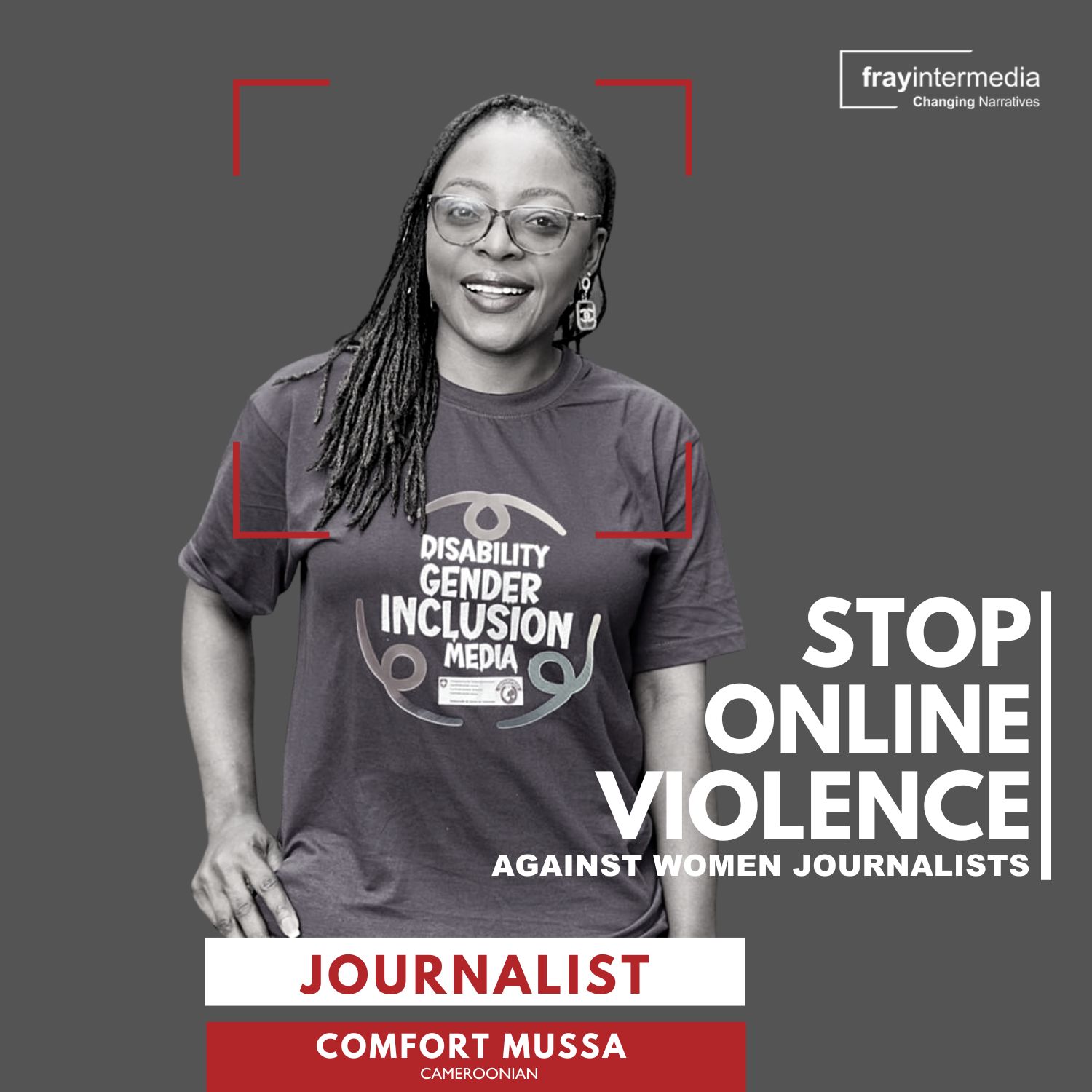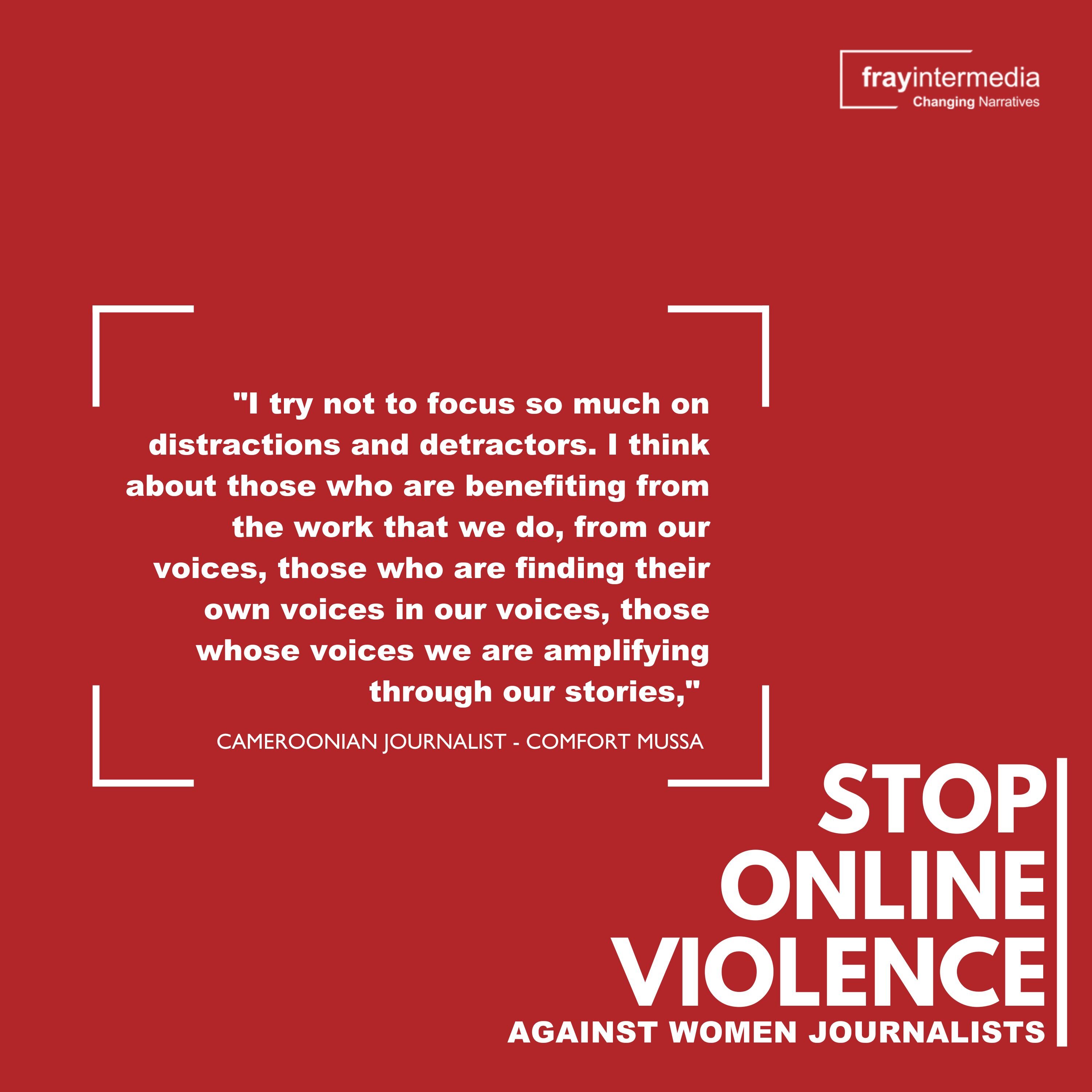Comfort Mussa, a prolific, multi-award-winning journalist with a keen eye for stories that expose social injustice, says, though online violence is a challenging part of the profession she stays because people like her remain the voice of the voiceless.

frayintermedia: Online violence is the new frontline in journalism safety – and women journalists sit at the epicentre of risk. What is your experience with online violence?
A: My experience with violence online is similar to the experiences of the average female journalist in Cameroon or in Africa or around the world. As a female and as a female journalist who works online also with an active online presence, I have been targeted in some misogynistic attacks. I have been bullied online. I’ve had people attack me.
I’ve had people write stuff about me online or attack my views or my works. And so most of it has just been attacked when I’ve written about intimate partner violence and, you know, talked about GBV. And some people have gone to my articles and attacked my personal life and say, oh, this woman is not married, she has no right to talk about GBV and things like that.
And also trolling and threats are a thing. There are people who have made posts actually outrightly threatening me because of my work.
frayintermedia: Do you now take any special precautions when expressing yourself on social media or in your stories?
A: I approach online spaces with the same caution and I take similar precautions to those you would take when crossing the street. When you cross the street without looking, you could be knocked down by an oncoming vehicle. That’s the same thing that happens online. If you do not take certain precautions, you could be attacked online.
And so the kind of precautions that I take is, first of all, to know which piece of my writing is circulating and where. Social media spaces vary. There are some spaces, like a WhatsApp group that is smaller and more intimate where you can express yourself and share certain details.
But on Facebook and Twitter and LinkedIn, it’s a very wide audience and anybody could have access to what you are saying and respond to it. So I’m careful with what level of information I disclose on different social media platforms.
I also take precautions sometimes by not making certain posts public. Maybe limiting it to just those who are my friends or who follow me. Another precaution is not putting a lot of personal details out there. You know that there are things that I really just want to keep to myself and I don’t put it.
As for my stories, I always double-check what I am publishing. Is it truthful? The fact that you are on social media doesn’t mean that you can just publish anything.
So, again, I think about what I have written. Is it verifiable? Is it something that can harm someone? I think about all these things and before posting stories or expressing myself on social media.
Journalistic precautions and ethical guidelines apply to social media too. Some of these guidelines or what counts as journalism, like if I pull something in later and I discover this fact was not correct, I will go on my page and apologise like I was misled.
frayintermedia: Orchestrated disinformation campaigns weaponise misogyny to chill critical reporting and discredit women journalists. How have you managed to keep raising your voice against all the noise?
A: Okey Ndibe, an acclaimed African writer, and author of the novel Arrows of Rain once said “A story that must be told never forgives silences,”. And this is the quote that inspires my resilience to keep talking, even when there’s a lot of backlash against critical voices or critical reporting and attempts sometimes to discredit a female journalist. Sometimes there is a lot of pressure. But it’s better just to sit quietly and then go through all of this.
Sometimes when orchestrated disinformation campaigns or the backlash comes, there is that option to be quiet.
Also think about the option to speak up because like I said in the quote, this quote keeps ringing in my head. And I have said it so many times that a story that must be told will not forgive silence, or if there is something that we have to say of course I’m going to say it. Even when there is noise amidst all of this, there are people that we are serving.
There are people that are making informed choices because we are providing them with relevant, verifiable, reliable information. So I try not to focus so much on distractions and detractors. I also think about those who are benefiting from the work that we do, from our voices, those who are finding their own voices in our voices, those whose voices we are amplifying through voices. We cannot give up on this important task just because there is noise.

frayintermedia: Despite the challenges, why do you stay in journalism?
There are challenges, but there are also great rewards. There are great rewards through journalism, providing people with relevant information to help them make informed choices is great.
But journalism is powerful in the way it changes lives, in the way it sheds light and provides direction in the way it amplifies voices. Sometimes you do a report or ask a critical question and someone will get back to you to say thank you. We were suffering. Thank you for raising this. Thank you for bringing this to the limelight.
Most recently, there’s been a crisis in some parts of Cameroon. And I interviewed some women widows from this war. And one of them, their sons, wrote to me and said, for the first time, I heard my mother’s story and the things she went through on your program because you could ask some critical questions. And this to me, is the essence of journalism amplifying voices and providing people with enough information to make choices in their lives. And the rewards far outweigh the challenges. That’s why I stay in this profession, and I’ve been doing it for 15 years now.
frayintermedia: In the context of an increasingly toxic information ecosystem for women, what does gendered online violence against women communicators mean for women’s narratives and rights?
A: Gendered Online Violence poses a great threat to women’s narratives and women’s rights. I know some people who have been silenced online. I know some people who have told me that the attacks they get online are too much and are messing up their sanity. So they have backed out. It has also scared people, you know, from talking about certain things online, there are some topics that are just taboo. You go there, and people come for you and attack you.
This silences critical voices and still leaves certain topics as taboo – when we talk about income or the topic of abortions and marital rape. There are some topics that you just can’t talk about freely, online or offline. People will come for you, they will attack you, they will demonise you.
Sometimes this affects the mental health of women communicators and they go silent on certain topics. And this kind of silence will only breed more problems for us and for the women that we serve. We cannot have full rights, for example, on things like sex and reproductive health. I mean you talk about the people who shut you down but that there are women in need of these services in Cameroon.
Q: What advice would you give to a woman journalist who is being targeted online?
A: First of all, we need to think of the online world we work in differently to stay online. For example, which platforms and tools are available to stay safe, understand our way around, and look around.
Some other things to learn are what we can do when we are attacked. How to rush for safety and also how to build your own community online. Some online spaces can really be lonely. So what I do is also try to find my tribe. It can be lonely online, especially if you’re a target for attacks. Find a community.
Build your community where you can also get some support online, but more importantly, understand the spaces you’re navigating so you know what to avoid and what to do and what not to do to stay safe. But sometimes even when you do all the right things, you will still be attacked.
So also know what to do when you are attacked and have a community that you can rush to for advice, comfort, strength, and for strategy.

